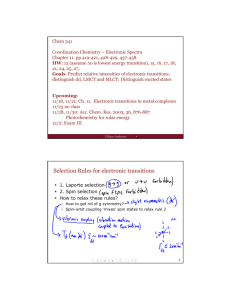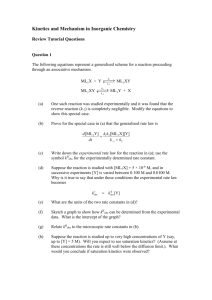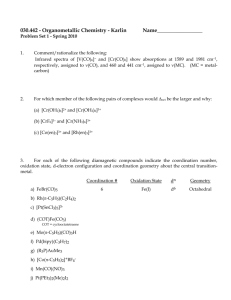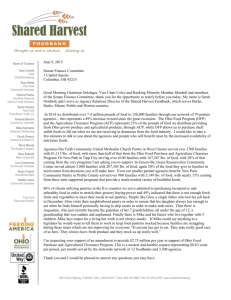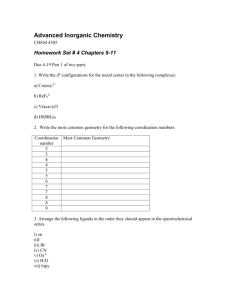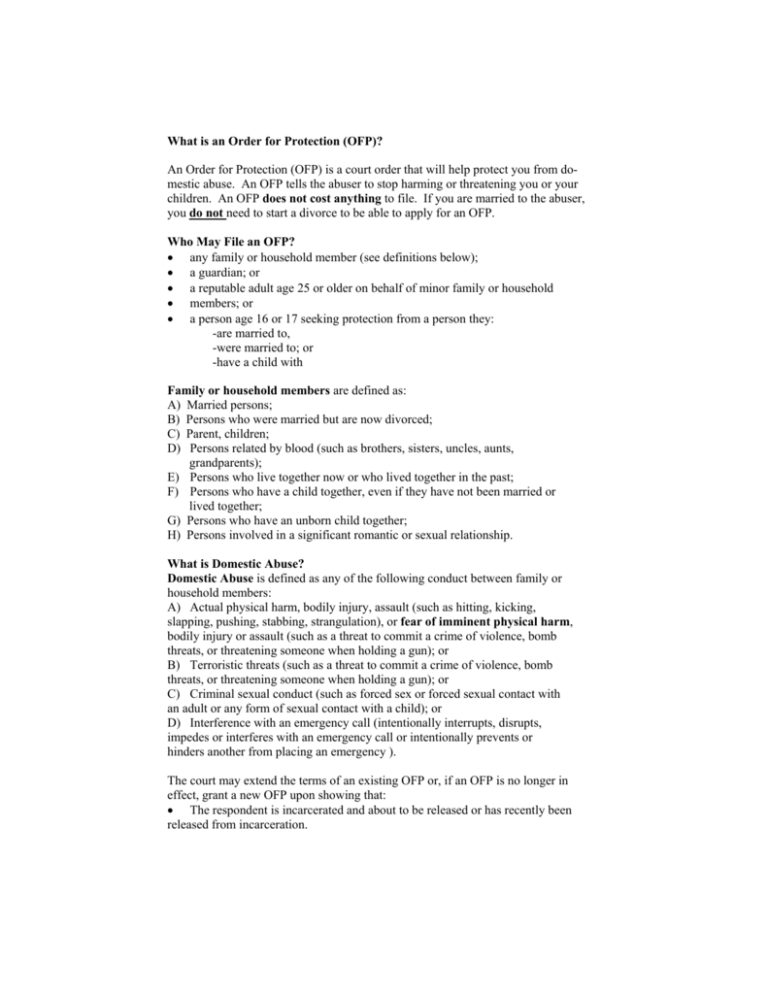
What is an Order for Protection (OFP)?
An Order for Protection (OFP) is a court order that will help protect you from domestic abuse. An OFP tells the abuser to stop harming or threatening you or your
children. An OFP does not cost anything to file. If you are married to the abuser,
you do not need to start a divorce to be able to apply for an OFP.
Who May File an OFP?
• any family or household member (see definitions below);
• a guardian; or
• a reputable adult age 25 or older on behalf of minor family or household
• members; or
• a person age 16 or 17 seeking protection from a person they:
-are married to,
-were married to; or
-have a child with
Family or household members are defined as:
A) Married persons;
B) Persons who were married but are now divorced;
C) Parent, children;
D) Persons related by blood (such as brothers, sisters, uncles, aunts,
grandparents);
E) Persons who live together now or who lived together in the past;
F) Persons who have a child together, even if they have not been married or
lived together;
G) Persons who have an unborn child together;
H) Persons involved in a significant romantic or sexual relationship.
What is Domestic Abuse?
Domestic Abuse is defined as any of the following conduct between family or
household members:
A) Actual physical harm, bodily injury, assault (such as hitting, kicking,
slapping, pushing, stabbing, strangulation), or fear of imminent physical harm,
bodily injury or assault (such as a threat to commit a crime of violence, bomb
threats, or threatening someone when holding a gun); or
B) Terroristic threats (such as a threat to commit a crime of violence, bomb
threats, or threatening someone when holding a gun); or
C) Criminal sexual conduct (such as forced sex or forced sexual contact with
an adult or any form of sexual contact with a child); or
D) Interference with an emergency call (intentionally interrupts, disrupts,
impedes or interferes with an emergency call or intentionally prevents or
hinders another from placing an emergency ).
The court may extend the terms of an existing OFP or, if an OFP is no longer in
effect, grant a new OFP upon showing that:
• The respondent is incarcerated and about to be released or has recently been
released from incarceration.
How do I get an Order for Protection?
Go to the courthouse and to Court Administration for the forms. If you would like
assistance in completing the forms or have questions on the process, contact
Blue Earth County Victim Services at 507-625-8688 or go online
at www.courts.state.mn.us.
What happen s after you file the OFP with Court Administration?
• The Judge will review the OFP and will either grant or deny the OFP. If the
OFP is granted, it can include an ex parte order (meaning a temporary emergency),
which is in effect once it is served on the respondent or the OFP can be set for
a hearing with no ex parte order. If the order is denied, you do have the right to
request a court hearing. If you have questions on what the Judge has granted,
ask Court Administrations or an advocate.
• If a hearing is scheduled, you need to attend the hearing. If you do not attend
The hearing, the OFP may be dismissed. If the respondent does not attend, the OFP
may be automatically granted by the Judge. If you would like an advocate to be
with you at the court hearing, notify an advocate at Blue Earth County Victim
Services.
• The respondent needs to be served personally with a copy of the OFP for it to
become effective. A police officer will contact you after services has been made. If
the respondent can’t be found within 14 days, Court Administrations can assist you
In serving the respondent by publication. You should not be charged a fee to have
notice served by publication.
• An OFP is a civil matter so you are not required to have an attorney. You do
have the option to hire an attorney on your own; one will not be appointed by the
court. If you cannot afford an attorney, contact Legal Aid at 1-888-575-2954. If
they are not able to help you, they may be able to refer you to another attorney.
What happens after the OFP is granted?
• Once granted, the OFP is usually in effect for a year. Within that year it can be
changed or modified depending on the circumstances and can also be extended for
additional time. Any time you want to change something, you need to file a
Modification Order with the court and a hearing may be scheduled, which you
need to attend. You can also ask the Court to dismiss the OFP at any time during
that year. All of the requests are subject to the Courts approval and may or may not
be granted.
• If you change your address, notify Court Administrations so that they can
provide copies of the OFP to the law enforcement in your new location.
• The OFP will automatically expire on the date and time listed on the Order. If
you would like the order kept in place, you can go to Court Administration and fill
out a form requesting the OFP be extended. You need to request an extension before
the expiration date; a hearing date will then be scheduled.
• If you dismiss your OFP and later the violence escalates, you can apply to the
Court for another OFP.
• Once you receive your copy of the OFP, provide copies to your employer,
daycare, and schools (if applicable). Keep a copy of the OFP with you at all
times in case law enforcement needs to view it for verification.
What happens if there is a violation of the OFP?
Contact law enforcement and report the incident, but also keep a log/record of your
own listing the date, time, witnesses, and what happened or what was said. Police
reports are free to victims and can be obtained by contacting the records department
at the Law Enforcement Center where the report was made.
When you report a violation, do not assume that the respondent will be picked up
and put in jail. Depending on the type of incident reported, law enforcement may
not arrest immediately. Just because they are not put in jail, does not mean that
they will not be charged with a violation. It is important to continue reporting the
incidents every time and to keep track of them in your own log.
Once a violation is charged, it is considered a criminal matter and each offense can
be enhanced, which means the penalties get more severe.
Leaving an abusive relationship is considered the most volatile and dangerous time,
And it is important to take safety precautions. Please read the brochure on Safety
Tips or talk with an advocate to develop a safety plan.
If you are in need of immediate protection because you are in danger, contact the
Day One Line at 1-866-223-1111 for the nearest available battered women’s shelter.
You are not required to file OFP to get services from a shelter.
Important Numbers
Law Enforcement –911
Blue Earth County Victim Services
Committee Against Domestic Abuse (CADA)
Battered Women’s Shelter– Mankato, MN 56001
Mailing Address:
P.O. Box 466, Mankato, MN 56002-0466
507-625-8688 Business
1-800-477-0466 Crisis
Statewide Bar Referral Services
Provides referrals to attorneys in
Minnesota
1-800-292-4152
Nicollet County Victim Services
Committee Against Domestic Abuse (CADA)
Battered Women’s Shelter– Mankato, MN 56001
Mailing Address:
P.O. Box 466, Mankato, MN 56002-0466
507-625-8688 Business
1-800-477-0466 Crisis
Day One Services
1-866-223-1111
Statewide referral to domestic abuse
shelters
Court Administration-Blue Earth County
507-304-4050
Nicollet County
507-934-0380
VINE
1-877-MN-4-VINE
Information on defendants in custody
Legal Aid Intake Line
1-888-575-2954
Legal services provided free of charge
to low-income individuals

